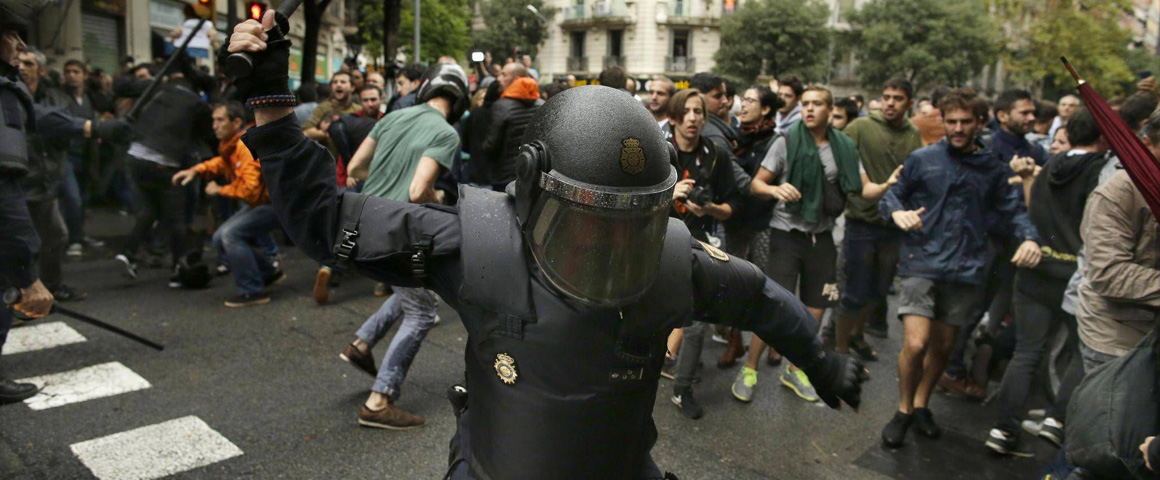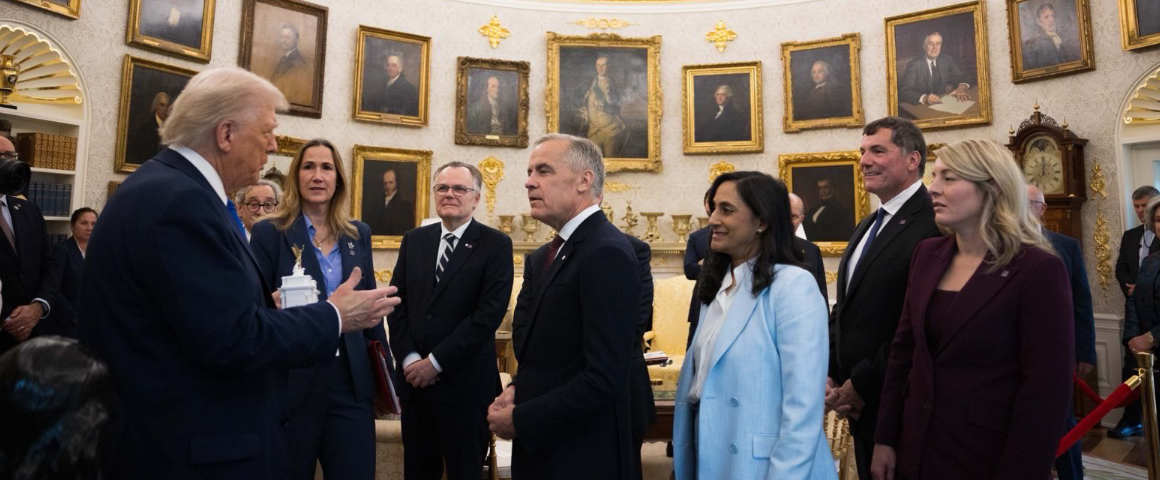Statement by the Central Executive Committee, Communist Party of Canada, Oct. 5, 2017
The Communist Party of Canada condemns the savage violence of the Spanish government of Mariano Rajoy exercised against the Catalan population, in order to prevent voting in a referendum on October 1, 2017 to decide on their future as a nation.
According to the Catalan authorities, more than 800 people were wounded by police forces, including nearly 100 more severely.
While Rajoy rejoiced that the Spanish state had succeeded in preventing the referendum “with all its strength”, the Catalan regional government announced that more than 90% of the 2.2 million ballots that could be counted supported the indpendence option. The police did manage to close 319 polling stations and seize the ballot boxes, so that approximately 770,000 ballots could not be counted. In total about 56% of the 5.3 million registered voters cast a ballot, or were prevented from voting by the repression.
This situation follows the Catalan regional parliament’s decision on September 6 to hold the Oct. 1 referendum on self-determination. After the referendum was declared illegal by the Spanish Constitutional Court, the Spanish government announced three days later that it would not recognise the result. About a million Catalan people went into the streets of Barcelona to demand the right of self-determination, that is, the right to decide for themselves.
On September 20, the Spanish police stormed the Catalan government, conducting searches and arresting a dozen senior officials, including the Minister of Finance, under the pretext of “disobedience”, “prevarication” and “misappropriation of funds” in connection with the organisation of the referendum. Again, thousands went into the streets of Barcelona to protest the arrests.
When the central government announced its intention to use force to prevent voting, thousands of people occupied the voting places. Although opinion polls initially did not give the majority of votes to the independence option, ironically, the authoritarian acts of the central government eventually seem to have rallied more and more people.
Following the vote, the Catalan authorities considered that a majority had clearly expressed themselves in favour of secession. They met behind closed doors to discuss the next steps in their plan to declare independence and separation from Spain, defying the Rajoy government. Forty-four Catalan organisations, including the main Catalan trade unions and two pro-independence associations, called for a one-day general strike and mobilisation on Tuesday October 3.
The authoritarian drift of the Spanish government, according to the Communist Party of the Peoples of Spain, is a qualitative leap in the process of liquidating freedoms during recent years. Today, this attack by the Rajoy government is launched against the right of the people of Catalonia, and imposes the de facto liquidation of the Generalitat (the political organization of the Autonomous Community of Catalonia). Tomorrow, it will be the rights of assembly and protest, and thus step by step, to the right to collective bargaining, the right to strike, etc., always justified by “defence of the law”.
The Communist Party of Spain (PCE) also supported the mobilizations to defend democratic freedoms and the right of national self-determination, calling for steps to restore normal democratic life, and for “an agreement between the [Spanish and Catalan] administrations that gives the Catalan people the right to vote peacefully with the full guarantee of being able to decide on the different ways of organizing themselves as a nation”, and to guarantee the social and labour rights that the two governments have undermined since 2010. Following the repression of Oct. 1, the PCE called for the resignation of President Rajoy, and for mobilization of the social and democratic forces of the whole country to find a way out of the crisis and avoid any unilateral action that would deepen it.
Silence of foreign governments
The European Commission considers the referendum illegal, and therefore supports the Spanish Government, declaring that this is an internal matter which must be settled in accordance with the constitutional order of Spain. The Commission says that “in today’s times we need unity and stability, not division and fragmentation.”
Most countries in Europe have also avoided pronouncing on this crisis. The French and U.S. presidents openly supported the Rajoy government, urging a united Spain.
Amnesty International has been content to deplore the use of excessive force employed by some police officers in the performance of their duties. According to AI, “the tensions are very strong, it is essential that Spanish legislation such as international human rights law be respected.”
The Canadian government said that “the question of [Catalonia] is a matter for the internal affairs of Spain.” Canada wants “a solution to the country’s internal debates to be found in harmony and respect for its constitutional framework,” said Foreign Affairs Minister Chrystia Freeland.
Strangely, that is not what the Canadian government has said in the case of Venezuela. Minister Freeland has happily interfered in the internal affairs of that country, especially when she openly attacked the Constituent Assembly election, which is provided for in the the Venezuelan Constitution, and by adopting economic sanctions against its political leaders.
On the other hand, in the Quebec National Assembly, the Couillard government first observed the same silence and invoked non-interference in the affairs of Spain. Premier Couillard has even maliciously tried to oppose the right to self-determination of Aboriginal nations to that of Quebec. But on October 4, fearing that public opinion may be very sensitive to the violence committed by the Spanish government one year before the next election in Quebec, the National Assembly unanimously adopted a motion denouncing that, violence and calling to resume political dialogue between Catalonia and Spain, with international mediation if both parties consented.
The real reason for this silence is that the Canadian state does not recognize the right of self-determination for the nations that make up this country, up to and including the right to secede. By not criticising the force used by Spain against Catalonia, it actually reserves the possibility of doing the same thing here.
While the Canadian state tolerated the holding of referendums in Quebec in 1980 and 1995, it subsequently passed the “Clarity Act”, which gives the federal government authority over the question, and the interpretation of the voting result. This is a complete denial of the right to self-determination, and it is imperative that the Canadian working class reject this form of national oppression.
Among the various components of the working class in this country, the Communist Party of Canada defends the idea of mutual recognition of the right to national self-determination, up to and including secession. Our aim is to promote unity and solidarity of the multinational working class in its struggle for socialism, and to reduce distrust and barriers which can divide workers along national lines, under the leadership of their respective bourgeoisies.




